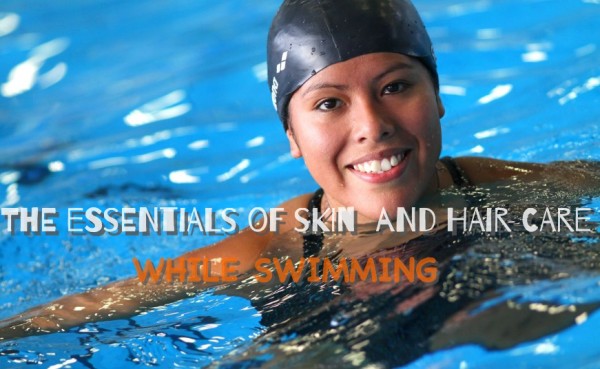I have recently joined swimming lessons. Like most people I claimed to have known swimming for years, but the truth is that, I can’t do a single lap in one go. Plus, my technique is all wrong. So finally, I decided to work on it. While my classes are coming along reasonably well, my skin and my hair texture seem to have taken the toll. I am getting tanned with the chlorine water and sunlight and my skin is also parching. My hair has gone from shiny to dull. I asked around for help in various Facebook and Whatsapp groups, as women can share and possess inane knowledge on these subjects. So what are the essentials of skin and hair care to remember while swimming?
I got loads of advise, but what I realised through my conversations was that most people believe that there is no effective solution to this. But then, I have never learnt to give up. So as usual, I did my research and have come up with these. At the end of the article we also have sought expert help from Dermatologist Dr. Falguni Shah.
Hair Care:
Before swim:Dry hair will absorb chlorine directly into the hair, but wet hair will slow down its absorption.Wet your hair and add an oil or silicone-based hair product like conditioner, serum or coconut oil. This will act as a barrier to the chlorine without leaving a residue in the water. Wear a swimming cap to avoid wetting hair while swimming. An easy trick is to use some warm water to help get your cap on, making it easier to put on.
After Swim: Wash out all the chlorine from your hair right after exposure. Use a swimmers shampoo that specifically removes these metals from your hair. A DIY alternative is to use apple cider vinegar. One part vinegar to 2 parts water poured over freshly shampooed hair will do the trick. Make sure to give it a final rinse. You can buy a specialty shampoo designed to get rid of chlorine and mineral deposits like copper. You can get concentrated vitamin C in a bottle from SwimSpray. Also, a home-made pack of honey, avocado or mayonnaise and egg yolk is very effective to give your strands that very necessary moisture. Mix together these ingredients and massage into your scalp. Wrap your head in a warm towel and leave it for about 10-15 minutes. Rinse out well with lukewarm water and shampoo as normal.
If you like the post, pin it!
Read More
Skin Care:
Before swim: Use a heavy-duty moisturizer or body lotion few minutes before applying your sunblock. Apply sunscreen with both UVA and UVB protection before stepping in, with a minimum SPF 30.
After Swim: Right after your swim, go straight to the shower and rinse the chemicals off your skin with soap and water. If your skin is super sensitive, you can opt for swimmer specific body washes that will neutralize the chlorine. If you’re going to use moisturizer, look for products high in antioxidants like vitamin E and vitamin C. These will help neutralize the chlorine as well. Vitamin C shower filters that are pretty inexpensive and which dechlorinates water. Bathing in hot water will exaggerate the risks because the chemicals can be inhaled with the steam. Also very important to have a bath asap, the longer gap you have, the more chlorine affects your skin.
How to make a DeChlorinating Lotion at home:
- 1/2 cup almond or olive oil
- 1/4 cup coconut oil
- 1/4 cup beeswax
- 2 tablespoons warm water
- 2 teaspoons vitamin C powder
- Optional: 2 tablespoons Shea Butter or Cocoa Butter
- Optional: Essential Oils, Vanilla Extract or other natural extracts to suit your preference
How to Make Lotion
- Combine oils and beeswax in a pint-sized or larger glass jar.
- In another small jar or bowl, add the vitamin c powder to the warm water and stir until dissolved.
- Fill a medium saucepan with a couple of inches of water and place the jar with the oils inside the saucepan and turn on medium heat.
- As the water heats, the ingredients in the jar will start to melt. Shake or stir occasionally to incorporate. When all ingredients are completely melted, pour into a small blender or food processor, or keep in the jar if using an immersion blender that will fit in the top of the jar.
- With blender or food processor on, slowly add the water/vitamin C mixture until blended and emulsified.
- Store in an air-tight glass jar.
- Use before swimming (preferably after rinsing skin) to minimize chlorine exposure. This is purposefully a small batch since no preservatives are used and it will only last one swim season.
Take care of your swimwear
Buy chlorine- and fade-resistant swimwear. A high spandex content is a plus, since it will help your suit keep its shape. Adding a few tablespoons full of vinegar to your wash will help neutralize chlorine, eliminate the smell, and even stop discoloration.
Keep yourself Hydrated
Carry a bottle of water and keep sipping on it. You can also drink non-alcoholic summer coolers to keep yourself hydrated and flush out toxins from your system.
Bathing in hot water will exaggerate the risks because the chemicals can be inhaled with the steam.
EXPERT HELP
We went a step ahead and consulted renowned dermatologist Dr. Falguni Shah, from Radiance Skin Clinic, and this is what she suggested;
http://www.namcopool.com/us/how-to-protect-your-skin-and-hair-from-the-effects-of-chlorine/
http://www.dermaswimpro.com
Source :http://news.health.com/2013/07/03/chlorine/
http://www.swimspray.com/blogs/chlorine-hair-and-skin/10460629-protecting-against-chlorine-damage-hair-skin
http://holisticsquid.com/4-cheap-and-easy-ways-to-protect-against-swimming-pool-chemicals/

